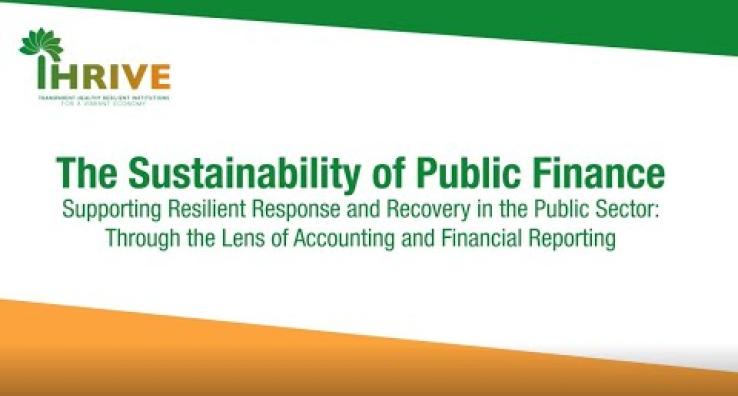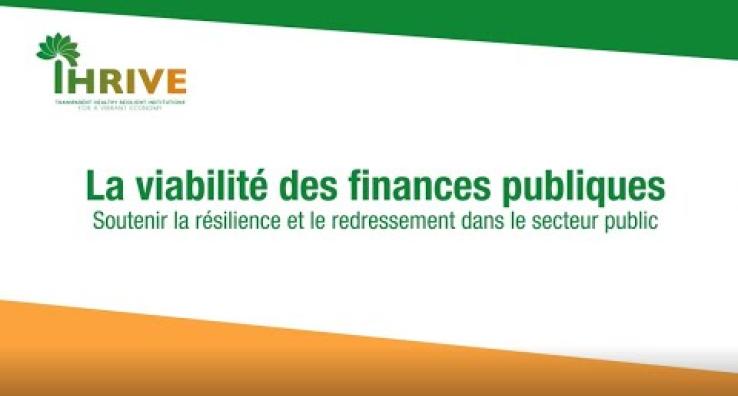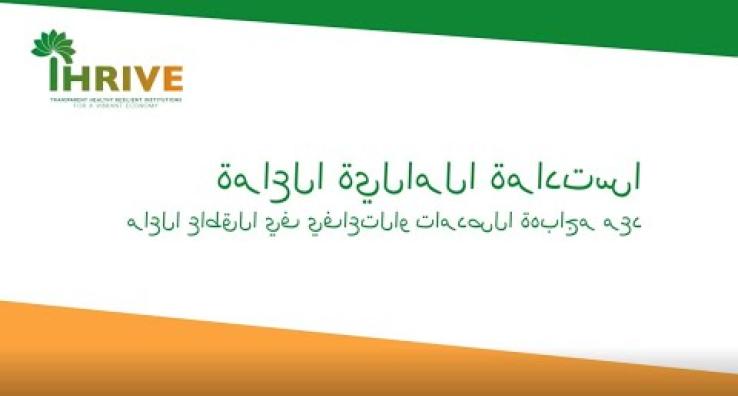Across the world, governments face the unprecedented impact of major simultaneous public health and economic crises. The on-going pandemic and looming economic recession require government interventions, which will impact public finances for years to come.
Amid the COVID-19 crisis, IFAC and the World Bank Group Governance Global Practice have come together for the inaugural THRIVE (Transparent, Healthy, Resilient Institutions for a Vibrant Economy) and second in the ADVANCE series of webinars: “The Sustainability of Public Finance—Supporting Resilient Response and Recovery in the Public Sector: Through the Lens of Accounting and Auditing.”
Held in English, French and Arabic language, the webinar considered the importance of high-quality financial reports based on International Public Sector Accounting Standards (IPSAS) and showcased the tools available to support the transition to accrual accounting.
The webinar provided an overview of the global and regional landscape of financial reporting practice and public financial management reforms.
The webinar also highlighted the role of the accountancy profession in enhancing the quality, trust, and transparency of public financial reporting and financial management for the public sectors, a key underpinnings for sustainable economic development
Over 800 participants joined the webinar, with 86% of post-webinar survey respondents noting that they are more likely to promote IPSAS implementation in their country after completing the event.
How can strong accounting support sustainable finances in the wake of the COVID-19 crisis? Through the conversation with leaders from the World Bank, the Ministry of Finance of the Kingdom of Saudi Arabia, IFAC and IPSASB, a few overarching takeaways emerged.
Strong public financial management is more important than ever.
In order to overcome current challenges, and plan for the future, strong public financial management is needed. Without a comprehensive understanding of public finances, governments cannot make decisions that support citizens over the long-term. In particular, achieving strong PFM requires adoption of accrual accounting and globally-accepted accounting standards, including IPSAS.
The COVID-19 crisis has shown the gaps in public sector infrastructure. We must improve public sector resiliency moving forward – and accounting is an important part of the equation.
Regional efforts are key, but remember that we’re all in this together.
National and regional governments have, for the large part, acted quickly to mitigate the health and economic repercussions of the pandemic. This is encouraging, but it also serves us well to remember that we’re in it together.
We are all fighting the same virus – and just as a vaccine will serve the interests of citizens globally, so will global efforts to provide financial support and learnings on policy and fiscal interventions.
Both the exchange of funds and information is key. Let’s not forget that we are all fighting this challenge together.
Take stock of any lessons for crisis-readiness moving forward.
Unfortunately, the COVID crisis is not the only pressing, systemic challenge we face as a global community. Climate change, for example, continues to threaten lives and livelihoods – and the consequences of the crisis will only deepen in the years to come.
To the extent possible, governments must take forward the lessons from COVID-19 – in terms of risk assessment, deployment of resources, policies to address ongoing crises, and others – to apply to future emergency situations we will inevitably face.
In short, this must be the time for change. Underpinning societies globally are strong governments – and governments are only strong when they make decisions that support citizens wellbeing. Good accounting practices and policies provide the high-quality information to support these strong decisions.
We must see the current crisis as an opportunity for change and improvement. When it comes to public sector sustainability, it’s about more than money changing hands – it’s about securing long-term health and wealth for citizens across the globe.
Watch the Full Webinar in English, French, or Arabic

The Sustainability of Public Finance: Supporting Resilient Response & Recovery in the Public Sector
Across the world, governments face the unprecedented impact of major simultaneous public health and economic crises. The on-going pandemic and looming economic recession require government interventions, which will likely impact public finances for years.
On July 22, 2020, the World Bank Group Governance Global Practice Middle East and Northern Africa (MENA), IFAC, and the International Public...

La viabilité des finances publiques—Soutenir la résilience et le redressement dans le secteur public
With simultaneous French translation, this webinar was conducted on July 22, 2020 by the World Bank Group Governance Global Practice Middle East and Northern Africa (MENA), IFAC, and the International Public Sector Accounting Standards Board (IPSASB).
The global webinar brought together a variety of experts to discuss what is needed to secure strong public financial management during and after...

استدامة المالية العامة - دعم مجابهة الصدمات والتعافي في القطاع العام
With simultaneous Arabic translation, this webinar was conducted on July 22, 2020 by the World Bank Group Governance Global Practice Middle East and Northern Africa (MENA), IFAC, and the International Public Sector Accounting Standards Board (IPSASB).
The global webinar brought together a variety of experts to discuss what is needed to secure strong public financial management during and after...
